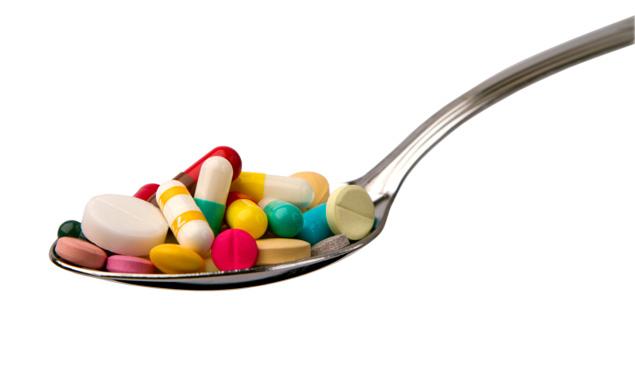Get These Essential Vitamins and Minerals
Ideally, we’d get all our essential vitamins and minerals from the foods we eat and our environment. But depending on your diet, you may need to supplement with vitamins and minerals. Here’s everything you need to know about taking supplements.

Vitamins
Vitamins are essential for good health. Because your body does not create vitamins, you need to make sure that you get them from your food. If you are eating a healthy balanced diet consisting mainly of fruits and vegetables, preferably organic, then you are getting most of the vitamins and minerals your body needs. However, if you eat a lot of processed foods, conventionally grown fruits and vegetables and conventionally farmed animals, you might need to add food-based vitamins to your regimen. There are two types of vitamins:
• Fat soluble vitamins are stored in the fat tissues in your body and in your liver. They remain there until your body needs them. They include vitamins A, D, E and K.
• Water soluble vitamins travel through your bloodstream and whatever your body doesn’t need is excreted in your urine. These include B complex, vitamin C and folic acid.
When it comes to nutrients, the most important thing to do is to listen to your body. If you have a craving for a particular food, it’s probably because you need the vitamin or mineral in it. If you decide to take a supplement, be aware that it often takes about two to four months for it to have any effect.
Here’s a list of common vitamins, with their benefits and natural sources:
Vitamin A: Increase your vitamin A intake when you have problems with your skin, seem to get infections, find it hard to see in the dark or want to see color more clearly. Natural sources include eggs, fish, liver oil, liver, orange fruits and vegetables like cantaloupe, carrots and sweet potatoes, and dark green leafy vegetables like kale, collards and spinach.
Vitamin D: Increase your vitamin D intake to better absorb calcium and develop strong bones. Vitamin D has been proven to alleviate depression, is administered as a preventative medicine against many serious illnesses and is also recommended if you have pain in your bones and muscle weakness. Natural sources include eggs, oily fish and some fortified milk.
Vitamin E: Increase your vitamin E intake to improve blood circulation, protect your lungs from being damaged by air pollution and maintain your body’s tissues. Natural sources are green leafy vegetables, nuts and seeds, egg yolks, sardines, wheat germ and whole grains.
Vitamin K: Increase your vitamin K intake if you have problems with blood clotting. Natural sources are leafy green vegetables, broccoli, milk, yogurt, cheese, eggs and meat.
Vitamin C: Increase your vitamin C intake when you are having problems with your gums or with nosebleeds, want to keep your muscles in good shape or have a wound or infection. Some natural sources of vitamin C are strawberries, tomatoes, broccoli, guavas, mangoes, cabbage, kiwi, red peppers, citrus fruits, cantaloupe, watermelon and papaya.
Vitamin B: The B vitamins are B1, B2, B6, B12, niacin, folic acid, biotin and pantothenic acid. Vitamin B is great to take if you want to increase your energy and improve your immune system. Vitamin B is commonly administered to those with a low red blood cell count (anemia) or an iron deficiency. Some good natural sources of vitamin B are meat, poultry, milk, yogurt, leafy green vegetables, beans, liver, nuts, wheat, oats and fish.
Folic Acid: if you have problems with anemia or are trying to get pregnant, you may want to take folic acid. Some good natural sources are spinach, green beans, cauliflower, Brussels sprouts, whole grain breads, cereals, bean sprouts and broccoli.
Minerals
Minerals are also vital for your body’s functioning. They help to strengthen the skeleton, preserve the brain, transmit nerve impulses to make hormones and keep the heart healthy.
There are two kinds of minerals:
• Macro Minerals: Your body needs large amounts of macro minerals, which include calcium, iron and zinc.
• Trace Minerals: Your body needs trace minerals, but in smaller amounts than macro minerals. These include iodine, chromium and selenium.
Here’s a list of essential minerals, with their benefits and natural sources:
Calcium: Take calcium to keep your bones and teeth strong and to support your nervous system. Good natural sources of it are dairy, leafy green vegetables and some fortified juices and cereals.
Iron: Take iron if you are anemic, meaning you have a low red blood cell count. Good natural sources of iron are meat, eggs, liver, dried fruits like raisins, fish and leafy green vegetables like broccoli and beans. Many iron supplements can cause constipation, so be sure to look for one that does not.
Zinc: zinc really helps your immune function, so if you are susceptible to colds and flus, take this as a supplement. Zinc also is known to increase fertility, is essential for cell growth and helps heal wounds. Natural sources of zinc include milk, eggs, meat, leafy vegetables like broccoli, whole grains and the skin of baked potatoes.
Iodine: If you have problems with your thyroid, you may have an iodine deficiency. Iodine helps to metabolize excess fat. Natural sources of iodine are milk, fish, iodized salt, garlic, mushrooms and asparagus.
Chromium: Chromium helps maintain normal blood sugar levels. One in ten Americans is deficient in this mineral. Natural source of chromium include meat, nuts, whole grains, corn oil and cloves.
Selenium: Selenium is an antioxidant that works in conjunction with vitamin E. It is found in Brazil nuts, brewer’s yeast, broccoli, dairy, meat, grains and seafood.


